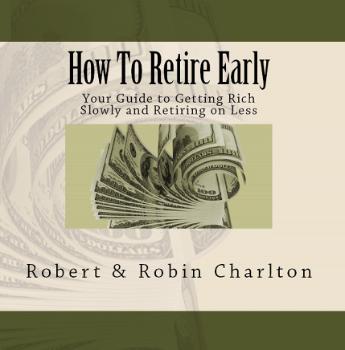

Early Retirement
| Four Myths About Early Retirement |
Early retirement is not a pipedream: it is achievable and primarily a question of
priorities and determination. We should know: we retired at the age of 43 after
15 years of slow-and-steady investing in index funds, managing to save about
a million dollars.
The good news: what we accomplished is repeatable by normal human beings
with normal everyday jobs and lives. So let’s debunk four myths about early
retirement while finding the kernel of truth hidden at the heart of each.
Myth #1. You can’t retire early unless you make a lot of money.
Not so. We never had high-powered jobs. I was a proposal coordinator and
my wife was a travel agent who retrained as a nurse. Our combined salaries
over 15 years averaged $89,000 per year, and that’s before taxes. During the
first 8 years of our 15-year investing plan we only earned an average of
$55,000 combined. So you don’t need a huge salary, but you do need the self-
discipline to set aside a sizable chunk of your salary each month. Really
believing you can retire early – and acting on that belief by socking away as
much as you can month by month – is the main thing it takes to make it
happen.
The kernel of truth: You do need to make more than minimum wage. The gap
between making and spending has to be wide enough that you can invest a
healthy amount each month while still making a go of it in the present. If you
and your spouse each earn $40K to $50K per year, say, that should be
enough if you’re reasonably frugal by nature.
Myth #2. It’s impossible to retire early if you have kids.
Tell that to Tom and Lisa from Winston-Salem, North Carolina, who managed
to retire in their early fifties with three kids. “Just do the math,” says Tom. “It is
possible. To say otherwise is really just a cop-out. Saving is hard. It means
making hard choices and working every day to save money on food, clothing,
housing, etc. It is not for the uncommitted.” Given the extra challenges parents
face, it makes sense for couples with kids to build extra time into their
investment plan and consider aiming for retirement in 20 to 25 years instead of
15. Investing smaller sums of money over a longer period of time lets the
power of compounding really work its magic.
The kernel of truth: “Absolutely it is harder,” say Tom and Lisa. “Raising
children is expensive, plus there is a lot of pressure to give the children every
‘advantage.’ That can translate to overspending.” Their solution was to
automate savings as much as possible through their 401(k) plan. “If it was up
to me to take out cash and save it every time I got paid,” says Tom, “I don't
think I could have resisted the temptation to overspend.”
Myth #3. You can’t retire early without being a cheapskate.
We’ve always spent liberally on travel – both before and after retirement –
because it’s important to us, but we’ve balanced that by spending less in other
areas of our lives. It’s more about being a conscious consumer and spending
wisely than not spending at all. Making sensible decisions on home and cars
alone – two of your most expensive possessions – can go a long way towards
ensuring your early retirement. In our case, we bought a modest starter home
and arranged for a 15-year instead of a 30-year mortgage to save on interest
payments. We also drove our cars into the ground! For all other spending
matters – food, clothing, entertainment, etc. – we simply used common sense.
It’s not about being a cheapskate, it’s about maintaining a healthy mix of living
for today and saving for tomorrow. Like your investment portfolio, your life
portfolio has to remain balanced.
The kernel of truth: It does help to have a frugal streak. Living below your
means is at the crux of retiring early. As a rule of thumb, you should try to
invest a quarter to a third of your income if you want to retire in 15 to 20 years.
But that still leaves two-thirds to three-quarters for living expenses plus some
fun along the way.
Myth #4. Even if I could retire early, I’d just be bored.
Really? Early retirement is financial independence plain and simple. It doesn’t
mean you can’t work and can’t pursue your passions: in fact just the opposite.
It means you have the time and freedom to pursue the things that matter most
to you, on your own terms, regardless of whether they pay well or don’t pay at
all. You decide what your early retirement looks like, not someone else.
Frankly we think most people use the boredom argument as a convenient
excuse not to try. Take a look at the rest of this webpage and tell us if we look
bored or unhappy!
The kernel of truth: It does help to build some structure into your life once you
retire. It’s up to you now to decide what each day, week, month, and year is
going to look like, so come up with your own recipe that balances productive
and enjoyable work with exercise, travel, leisure, etc. One thing is for certain:
time is the ultimate limited resource, so having more of it to spend is a gift, not
a burden. Don’t let anyone tell you otherwise!
priorities and determination. We should know: we retired at the age of 43 after
15 years of slow-and-steady investing in index funds, managing to save about
a million dollars.
The good news: what we accomplished is repeatable by normal human beings
with normal everyday jobs and lives. So let’s debunk four myths about early
retirement while finding the kernel of truth hidden at the heart of each.
Myth #1. You can’t retire early unless you make a lot of money.
Not so. We never had high-powered jobs. I was a proposal coordinator and
my wife was a travel agent who retrained as a nurse. Our combined salaries
over 15 years averaged $89,000 per year, and that’s before taxes. During the
first 8 years of our 15-year investing plan we only earned an average of
$55,000 combined. So you don’t need a huge salary, but you do need the self-
discipline to set aside a sizable chunk of your salary each month. Really
believing you can retire early – and acting on that belief by socking away as
much as you can month by month – is the main thing it takes to make it
happen.
The kernel of truth: You do need to make more than minimum wage. The gap
between making and spending has to be wide enough that you can invest a
healthy amount each month while still making a go of it in the present. If you
and your spouse each earn $40K to $50K per year, say, that should be
enough if you’re reasonably frugal by nature.
Myth #2. It’s impossible to retire early if you have kids.
Tell that to Tom and Lisa from Winston-Salem, North Carolina, who managed
to retire in their early fifties with three kids. “Just do the math,” says Tom. “It is
possible. To say otherwise is really just a cop-out. Saving is hard. It means
making hard choices and working every day to save money on food, clothing,
housing, etc. It is not for the uncommitted.” Given the extra challenges parents
face, it makes sense for couples with kids to build extra time into their
investment plan and consider aiming for retirement in 20 to 25 years instead of
15. Investing smaller sums of money over a longer period of time lets the
power of compounding really work its magic.
The kernel of truth: “Absolutely it is harder,” say Tom and Lisa. “Raising
children is expensive, plus there is a lot of pressure to give the children every
‘advantage.’ That can translate to overspending.” Their solution was to
automate savings as much as possible through their 401(k) plan. “If it was up
to me to take out cash and save it every time I got paid,” says Tom, “I don't
think I could have resisted the temptation to overspend.”
Myth #3. You can’t retire early without being a cheapskate.
We’ve always spent liberally on travel – both before and after retirement –
because it’s important to us, but we’ve balanced that by spending less in other
areas of our lives. It’s more about being a conscious consumer and spending
wisely than not spending at all. Making sensible decisions on home and cars
alone – two of your most expensive possessions – can go a long way towards
ensuring your early retirement. In our case, we bought a modest starter home
and arranged for a 15-year instead of a 30-year mortgage to save on interest
payments. We also drove our cars into the ground! For all other spending
matters – food, clothing, entertainment, etc. – we simply used common sense.
It’s not about being a cheapskate, it’s about maintaining a healthy mix of living
for today and saving for tomorrow. Like your investment portfolio, your life
portfolio has to remain balanced.
The kernel of truth: It does help to have a frugal streak. Living below your
means is at the crux of retiring early. As a rule of thumb, you should try to
invest a quarter to a third of your income if you want to retire in 15 to 20 years.
But that still leaves two-thirds to three-quarters for living expenses plus some
fun along the way.
Myth #4. Even if I could retire early, I’d just be bored.
Really? Early retirement is financial independence plain and simple. It doesn’t
mean you can’t work and can’t pursue your passions: in fact just the opposite.
It means you have the time and freedom to pursue the things that matter most
to you, on your own terms, regardless of whether they pay well or don’t pay at
all. You decide what your early retirement looks like, not someone else.
Frankly we think most people use the boredom argument as a convenient
excuse not to try. Take a look at the rest of this webpage and tell us if we look
bored or unhappy!
The kernel of truth: It does help to build some structure into your life once you
retire. It’s up to you now to decide what each day, week, month, and year is
going to look like, so come up with your own recipe that balances productive
and enjoyable work with exercise, travel, leisure, etc. One thing is for certain:
time is the ultimate limited resource, so having more of it to spend is a gift, not
a burden. Don’t let anyone tell you otherwise!
